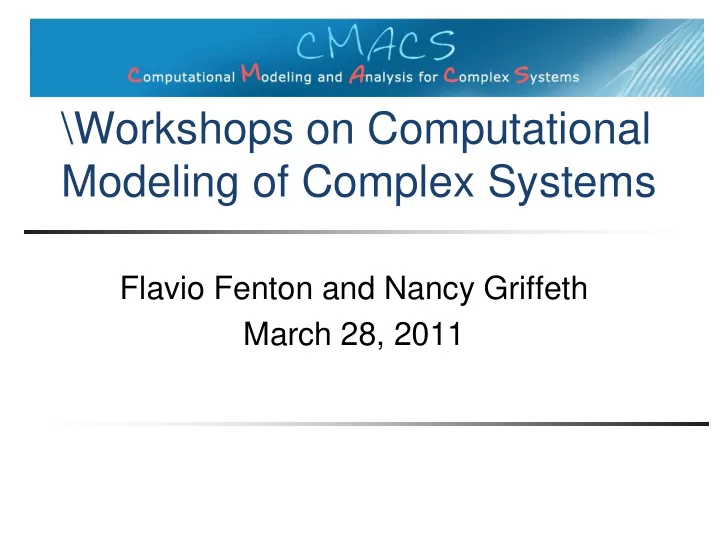

\Workshops on Computational Modeling of Complex Systems Flavio Fenton and Nancy Griffeth March 28, 2011
Workshop Objectives Disseminate project work among promising students Encourage enthusiasm for research and modeling complex systems Find good prospects for REU and graduate programs Encourage under-represented minorities to enter STEM fields Encourage inter-disciplinary work Develop course materials
Outline Recruiting and Admission: Nancy 2011 Workshop on Atrial Fibrillation Week 1: Flavio Weeks 2-3 and Evaluation: Nancy Student Results and Paper: Flavio 2012 Workshop on Cellular Signaling Pathways
2011 Workshop: Recruiting and Admission Target Colleges: Lehman, Hunter, Brooklyn, Queens, CCNY Applicants: 2010 2011 Applied Admitted Applied Admitted Brooklyn 5 4 4 2 Hunter 8 4 6 6 Lehman 11 6 6 4 Queens 0 0 4 3 Stony Brook 1 1 Total 25 15 20 15
2011 Workshop: Student Characteristics Ethnicity Number Major Number African- 3 Math 6 American Woman 5 Bio 4 Hispanic 3 CS 7
Workshop Attendees
Workshop Outline Biology background: Week 1 (Flavio Fenton, Rupinder Singh) Mathematical and Programming background: Week 2 Student Project: Week 3
Week 2 Mathematical preliminaries Modeling exercise and differential equations – Terri Grosso Numerical Integration – Kai Zhao Introduction to CUDA – Joshua Rogers The 4V Model and Code – Ezio Bartocci
Week 3 Students worked in 5 groups (same as week 2) Flavio assigned parameters to each group Using Ezio’s code on various CUDA machines * , students generated data Flavio reviewed the work via Skype *Thanks to Brian Murphy and NVIDIA
Week 1 Complex Systems and Biological Background CMACS and its goals Chaos and complex systems Experimental exercises with oscillators Relation between oscillators and cardiac cells Mathematical modeling of cardiac cells Cardiac arrhythmias and its study by computer simulations
Week 1 Saline Oscillator
Week 1 Saline Oscillator
Week 1 Saline Oscillator
Week 1 Saline Oscillator
Week 1 Chemical Oscillators Briggs-Rauscher and Belousov-Zhabotinsky
Week 1 Chemical Oscillators Briggs-Rauscher and Belousov-Zhabotinsky
Students Results
Students Results
Student Evaluations – General Objectives 5 4.5 4 3.5 3 2.5 2 1.5 1 0.5 0 1 Continuing 2 3 4 Attend another 5 6 7 Worthwhile 8 9 Confidence 10 11 12 13 14
Student Evaluations – Specific Learning Objectives 5 4.5 4 3.5 3 2.5 2 1.5 1 0.5 0 Analyze models Biological Build models processes Verify Scientific properties How research Hypotheses works
Best things about workshop… Learning experience A ground-up exposure to the process of formulating a model Running the Simulations of the Spiral waves on the cuda GPU Learning how heart fibrillation works Learning about the resources and technology … necessary for … research Applications of parallel computation to simulate the human heart Collaboration The opportunity to collaborate with other peers in different disciplines. Seeing how every area of science (Biology, Math) work together to solve the real world problems from very distinguished professors Future plans This workshop inspired me to pursue information outside of my own discipline. Getting a sense that I am capable of doing similar research
Suggested improvements More of the biological background relevant to our models. I really enjoyed Robert Gilmore’s presentation … it would have been more helpful to begin with [it]. [Topics], whether biology, math, or programming, [were] first presented in a complex manner and then more simply. More time to working on projects and presentations I would do the Math first. [More on] how to construct a basic differential equation that describes some simple behavior Week one : general introductions of the concept to students of all majors. Week two : separate students by majors and provide more intense learning in the field related to each group Week three : final project
Planned 2012 Workshop Challenge problem: Pancreatic Cancer Collaborators: Jim Faeder, Ed Clarke, …
Recommend
More recommend